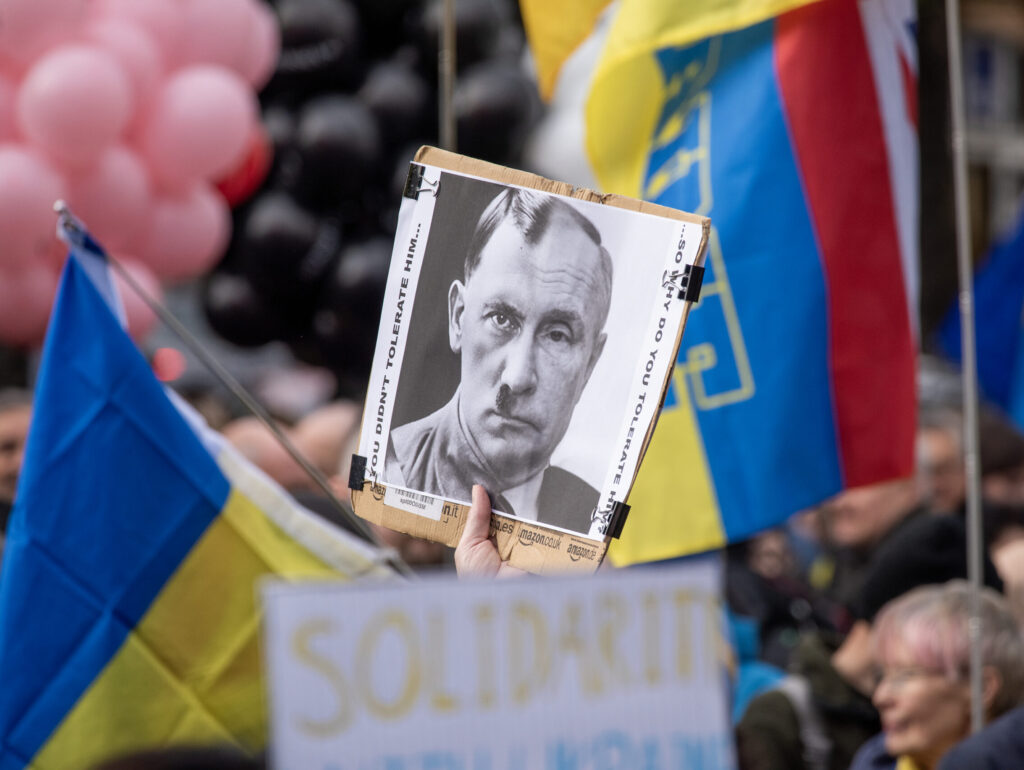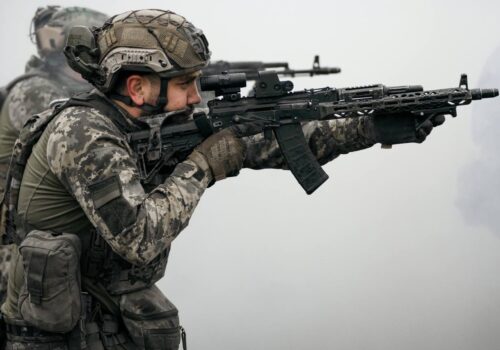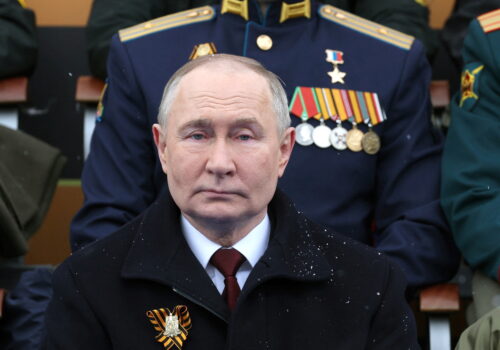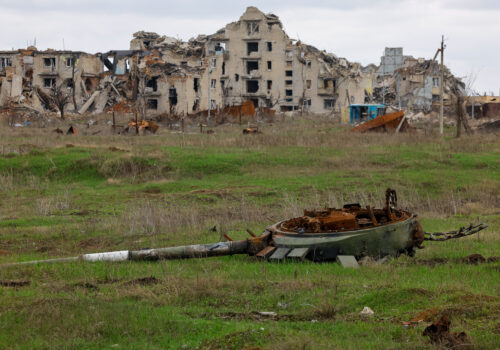As the world prepares to mark the eightieth anniversary of the victory over Nazi Germany, the shadow of events leading up to World War II hangs over efforts to end Russia’s current invasion of Ukraine. In order to avoid the horrors of another global conflict, Western leaders must apply the lessons learned from the struggle against twentieth century totalitarianism.
US President Donald Trump’s efforts to initiate peace talks between Russia and Ukraine reflect a commendable desire to end the war. Nevertheless, after more than three months of Russian stalling tactics and empty promises, it should now be abundantly clear that attempting to negotiate a meaningful compromise with Vladimir Putin was a mistake.
Since the current peace process began in early February, the Russian ruler has refused to join Ukraine in backing a US proposal for an unconditional ceasefire. Instead, Putin continues to insist on maximalist goals that reflect his undiminished determination to erase Ukrainian statehood and subjugate the Ukrainian people.
Putin’s demands include the comprehensive disarmament of the Ukrainian military and the reestablishment of Russian dominance in all spheres of Ukrainian public life (euphemistically called “denazification” by the Kremlin), along with official international recognition for Russia’s territorial gains and an end to all military support for Kyiv. If implemented, Putin’s terms would leave Ukraine partitioned, isolated, and defenseless. This is not a negotiating position; it is a call for Kyiv’s capitulation.
Stay updated
As the world watches the Russian invasion of Ukraine unfold, UkraineAlert delivers the best Atlantic Council expert insight and analysis on Ukraine twice a week directly to your inbox.
While Russia’s ultimate objectives remain unchanged, there is a very real danger that Putin may seek to exploit Trump’s evident ambition to settle the Ukraine issue as soon as possible. He could do so by agreeing to a temporary ceasefire that would lead to a pause in hostilities, while creating the conditions to complete the conquest of Ukraine following the end of Trump’s presidency. This would allow Putin to lift sanctions, rebuild the Russian army, and destabilize Ukraine from within.
In order to secure Kremlin backing, a ceasefire deal would need to hand Putin the semblance of victory while denying Ukraine any genuine and reliable security guarantees. Alarmingly, reports indicate that current US peace proposals go a long way toward meeting these conditions.
Crucially, the United States is reportedly prepared to officially recognize the Russian seizure of Ukraine’s Crimean peninsula. This has led to inevitable comparisons with the 1938 Munich Agreement, which saw Britain and France hand Czechoslovakia’s Sudetenland over to Nazi Germany in the hope that this would satisfy Adolf Hitler. Instead, the shameful deal struck in Munich encouraged the Nazi dictator to escalate his territorial demands. Less than a year later, World War II began.
The appeasement policies of the 1930s have long been condemned for enabling the rise of Hitler. Attempts to appease Putin have produced strikingly similar results. After Russia invaded Georgia in 2008, Western efforts to downplay the war and resume “business as usual” only served to embolden the Kremlin. When Russia’s 2014 invasions of Crimea and eastern Ukraine again failed to produce a resolute Western response, Putin interpreted this as a tactic green light to go further. This paved the way for the full-scale invasion of 2022.
Eurasia Center events

It should now be obvious to any objective observer that the continued appeasement of Putin will further fuel his imperial ambitions. This would be potentially fatal for Ukraine itself. It would also be disastrous for the future of international security.
Putin’s revisionist agenda is not limited to Ukraine. He openly speaks of establishing a new world order and frequently laments the fall of the Russian Empire, which at its peak included more than a dozen currently independent nations beyond Ukraine, from Finland and Poland in the west to the Southern Caucasus and Central Asia. If Putin is allowed to succeed in Ukraine, it is delusional to think he will simply stop. On the contrary, abandoning Ukraine to Russia would dramatically increase the chances of a far larger conflict in the coming years.
In order to prevent this nightmare scenario from materializing, the West must demonstrate maximum unity and an uncompromising commitment to Ukraine’s survival as an independent state. Putin interprets any talk of compromise as a sign of weakness. The only language he truly understands is the language of strength.
The most effective deterrent remains Ukrainian membership of NATO. Unsurprisingly, Putin has worked hard to prevent this from happening. He has employed nuclear blackmail to intimidate the West, and has spent years spreading false narratives about an alleged NATO security threat to Russia itself.
Putin’s objections to Ukrainian NATO membership do not stand up to scrutiny. Notably, he has been unable to explain why he went to war over Ukraine’s distant hopes of joining NATO but did nothing to oppose Finland’s recent NATO accession, despite the fact that Finnish membership of the alliance more than doubled Russia’s NATO borders overnight. Indeed, Russia already shares borders with six NATO member states and leaves these frontiers largely unguarded. Putin’s real problem is evidently with Ukrainian independence and not NATO enlargement.
Bringing Ukraine into NATO would serve as a powerful barrier to future Russian invasions and would dramatically reduce the likelihood of a major European war without undermining Russian national security. However, this would require a degree of political will on the part of the United States and major European powers including Britain, France, and Germany that is currently absent. Unless that changes, Western leaders must come up with a credible alternative to NATO membership that will guarantee Ukraine’s long-term security.
Nobody wants peace more than the Ukrainian people. But Ukrainians also recognize that well-meaning efforts to compromise with the Putin regime will only encourage further Russian aggression. Similar policies aiming to accommodate and appease Hitler led directly to World War II. If Western leaders wish to prevent a repeat of this catastrophic outcome, they must stop offering the Kremlin concessions and demonstrate the kind of resolve that Russia respects.
Oleksandr Merezhko is a member of the Ukrainian Parliament for the Servant of the People Party and Chair of the Ukrainian Parliament’s Foreign Affairs Committee.
Further reading
The views expressed in UkraineAlert are solely those of the authors and do not necessarily reflect the views of the Atlantic Council, its staff, or its supporters.

The Eurasia Center’s mission is to enhance transatlantic cooperation in promoting stability, democratic values, and prosperity in Eurasia, from Eastern Europe and Turkey in the West to the Caucasus, Russia, and Central Asia in the East.
Follow us on social media
and support our work
Image: Krisztian Elek / SOPA Images via Reuters Connect




